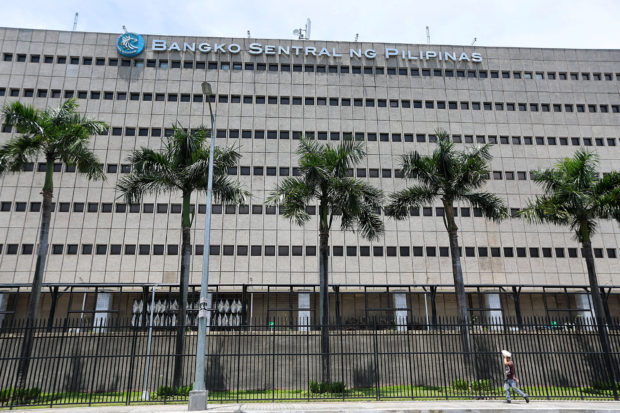
A pedestrian walks pass the Bangko Sentral ng Pilipinas (BSP) complex along Roxas Boulevard in Manila. The BSP is the Central Bank of the Philippines and was established on July 3, 1993, pursuant to the provision of Republic Act 7653 or the New Central Bank Act of 1993.
INQUIRER PHOTO / GRIG C. MONTEGRANDE
Inflation likely hit a new high in more than five years in July following the implementation of a jeepney fare hike and another round of increase in cigarette excise tax such that economists expect a further rate adjustment upward—by a much as 50 basis points—by the Bangko Sentral ng Pilipinas.
The July inflation forecasts of economists polled by the Inquirer last week ranged between 5.4 percent and 5.8 percent—all higher than June’s 5.2 percent.
The government will release the inflation report for July tomorrow, Aug. 7.
Ateneo de Manila University economics professor Alvin P. Ang had the highest forecast of a 5.8-percent year-on-year average increase in the prices of basic goods and services, citing price adjustments in electricity and transport costs.
The minimum jeepney fare was increased to P9, from P8 previously, since July 9.
Both Nomura economist Euben Paracuelles and Rizal Commercial Banking Corp.’s Michael E. Ricafort projected 5.6-percent headline inflation for July.
“Inflation could remain higher and could peak in the third quarter due to weaker peso exchange rate (US dollar/peso exchange rate at 12-year highs), higher crude oil prices (3.5-year highs), hike in minimum jeepney transport fare and higher electricity rates. Second-round inflation effects of these factors in terms of upward adjustments in the prices of other affected goods and services may have also contributed to the higher inflation. Petitions for higher minimum wages and for additional hike/s in electricity/utility rates, once granted, would add to second-round inflation effects in the coming months,” Ricafort explained.
For Capital Economics Asia economist Alex Holmes as well as Land Bank of the Philippines market economist Guian Angelo S. Dumalagan, inflation likely rose by 5.5 percent last month.
Price drivers
“The acceleration in consumer prices was likely driven by faster increases in the prices of food, especially rice which accounts for a sizable chunk of the market basket. The rise in water and electricity rates as well as the hike in transportation fares also pushed inflation higher, despite a slower, albeit still elevated, increase in fuel prices and a softer, yet still significant, annual depreciation of the peso,” Dumalagan said.
Pauline May Ann E. Revillas of Metropolitan Bank and Trust Co.’s research department said their forecast for July inflation was 5.5 percent on still elevated food and gasoline prices, adding that “price pressures are seen to come from higher electricity rates and increases in transport fares.”
The projection of Barclays’ Rahul Bajoria was 5.4-percent headline inflation in July, adding that he expected a 50-basis-point interest rate hike when the BSP’s policy-setting Monetary Board meets on Aug. 9, Thursday.
HSBC economist for Asean Noelan Arbis, Holmes and Paracuelles also expect the policy rate to be raised to 4 percent from 3.5 percent at present.
“We expect a 50-basis-point hike from the BSP at its upcoming meeting, given the inflation shock that we witnessed in June. Inflation is now likely to peak higher and remain above target for longer than initially expected given the ‘June shock,’ which we believe requires an aggressive response from the BSP. Moreover, another inflation shock cannot be completely ruled out as the recent inflation prints likely further heighten inflation expectations and may lead to another round of broad-based price increases. They also largely minimize the effects of inflation-mitigating measures (such as rice tarrification) over the near term,” according to Arbis.
Rate hike certain
As for Oxford Economics economist Beatrice Tanjangco as well as Ang, Dumalagan, Revillas and Ricafort, the BSP would raise the key interest rate by “at least” or “a minimum of” 25 basis points to 3.75 percent.
In a report titled “Philippines central bank to turn more aggressive?” London-based Capital Economics said that “rising inflationary pressures mean that the central bank of the Philippines (BSP) is almost certain to raise interest rates at its meeting on Thursday, the only question is by how much.”
“The answer will depend in large part on July’s inflation figures, which are due to be released two days before the rate announcement. Inflation in the Philippines has risen rapidly this year, from 2.9 percent year-on-year in December to 5.2 percent in June,” Capital Economics said.